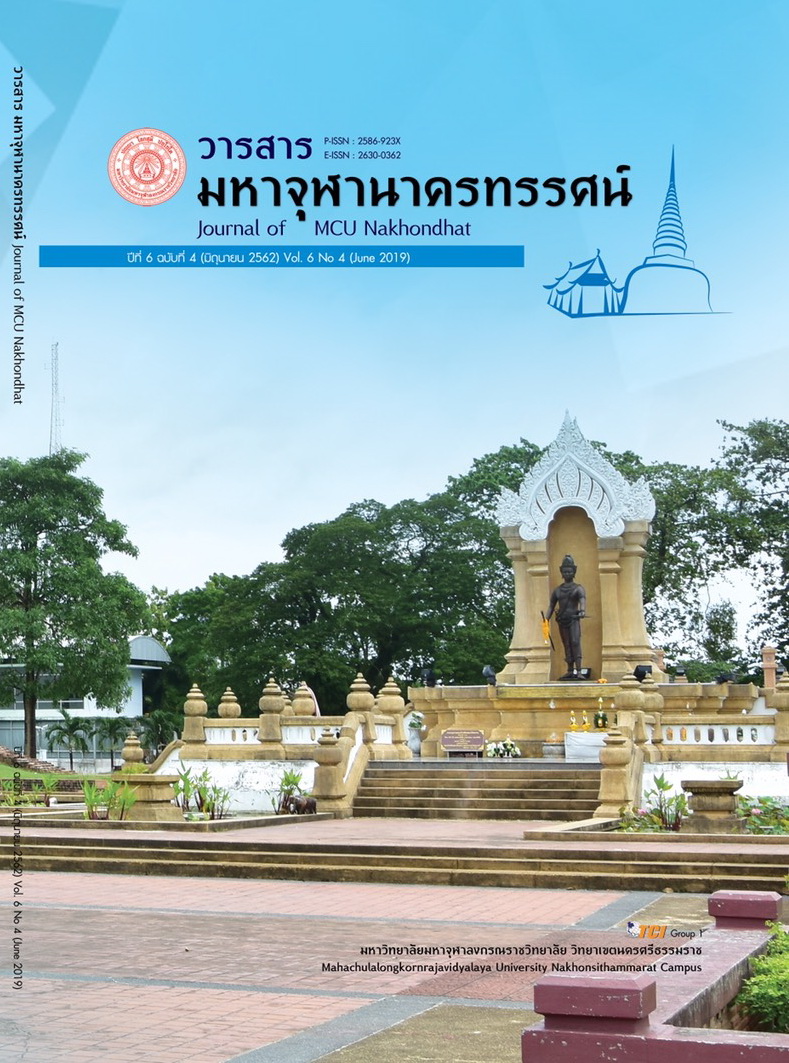THE GUIDELINES FOR THE APPLICATION OF VISAKHA’S PRINCIPLES OF THE HOUSEHOLD LIFE INTO THE PRESENT THAI SOCIETY
Main Article Content
Abstract
The research aimed 1) to study the guidelines of the household life of the current Thai society, 2) to explore Visakha's principles of the householder, and 3) to investigate the applications of Visakha's principles of the household life in the current Thai Society. The research was conducted with qualitative research methodology, focusing on document analysis with documentary research from various data sources so as to analyze the contents according to the determined scope of the research.
The findings were as follows:
Principle of the concept of household life of the current Thai society includes the components of the household life consisting of choosing a right spouse, the characteristics of the mates in each pair, the qualifications of the householders which are the qualifications of the husband, the wife and the children, the context of the present Thai society, the factors affecting changes in the current Thai society that affects the change of household life, the development of the household in Thai society. Dhamma principles promoting stability in the household life which are a very important part include the principles of Gharàvàsa-Dhamma, (the Dhammaprinciples for householders) and the principles of Sangahavatthu (principles of service). These Dhamma principles should be taken into practice by all householdersas it is a very significant part. If they are put into practice, it will lead to peaceful household life.
The practices of Visakha's household life were considered to be a good model for other householders. There should be a study of Visakha's biography from early childhood onwards in order to know her history, starting from the birthplace, Sotapanna attainment (attaining a stream enterer), marriage, special characteristics, important roles, and virtues. She was a strongly devout Buddhist, a good child of parents, faithful to her husband, a model Buddhist, and an example of household living in accordance with the principles of the Ten-Admonitions.
In terms of the application of Visakha's principles of household life in the present Thai society, the application of Visakha's principles of household life can be seen when the Ten-Admonitions or ten headings of advice were given to Visakha on her wedding day by a millionaire named Dhanañjaya, Visakha'sfather.TheseTen-Admonitions were the instructions leading practitioners to the peaceful household life. Therefore, the application of the Dhamma principles promoting the householder becomes a vital factor for enabling Thai society to truly realize the value of household life.
Article Details
References
ทัศนีย์ ฉ่ำพิรุณ. (2554). “บทบาทและหน้าที่ของสตรีในฐานะผู้อยู่เบื้องหลังความสำเร็จของครอบครัวตามแนวพระพุทธศาสนา : ศึกษาเฉพาะกรณีแม่บ้านทหารอากาศ”. ใน วิทยานิพนธ์พุทธศาสตรมหาบัณฑิต สาขาพระพุทธศาสนา. มหาวิทยาลัยมหาจุฬาลงกรณราชวิทยาลัย.
พระสุเมธ สุเมโธ (นภดลจินดา). (2544). “ศึกษาเปรียบเทียบบทบาทในการส่งเสริมพระพุทธศาสนาของนักธุรกิจในสมัยพุทธกาลกับปัจจุบัน: ศึกษาเฉพาะกรณี ดร.บุญยง ว่องวานิช”. ใน วิทยานิพนธ์พุทธศาสตรมหาบัณฑิต สาขาพระพุทธศาสนา. มหาวิทยาลัยมหาจุฬาลงกรณราชวิทยาลัย.
มหาจุฬาลงกรณราชวิทยาลัย. (2539). พระไตรปิฎกภาษาไทยฉบับมหาจุฬาลงกรณราชวิทยาลัย. กรุงเทพมหานคร: โรงพิมพ์มหาจุฬาลงกรณราชวิทยาลัย.


